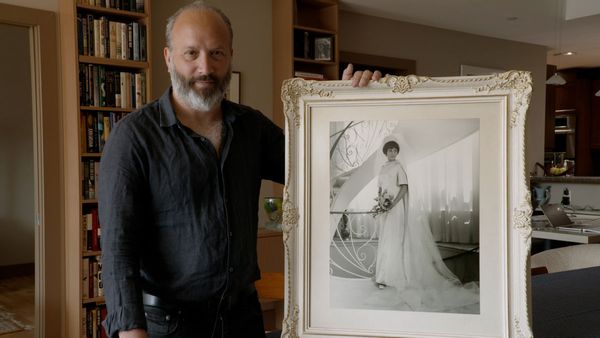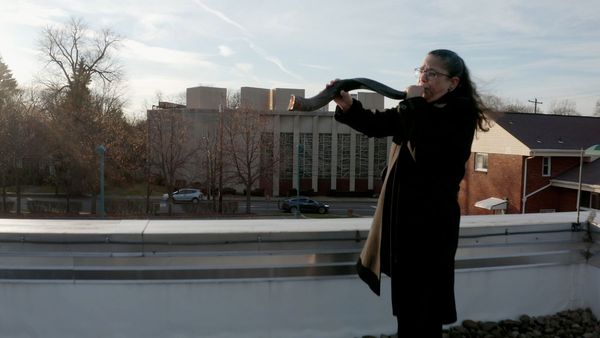
There are undoubtedly times when some people wonder how many documentaries about hate-fueled mass shootings will be made. This is not said from a place of cynicism or worse, some heartless notion that the latest, "A Tree of Life: The Pittsburgh Synagogue Shooting," is merely a different telling of a type of tragedy Americans have accepted to be part of life in this country.
Trish Adlesic's singularly affecting, enormously moving work is much more that. Four years nearly to the day after the October 27, 2018 mass shooting that ended the lives of 11 people who were gathered at the Tree of Life Synagogue, the Pittsburgh native presents a film that is at once a tender remembrance and a chilling warning about the mainstreaming of antisemitism in American culture.
In the face of that terrible tide, the survivors and the people from local and national faith communities rallying around them still promote a hopeful vision of communities unified against injustice and bigotry. This tone that informs Adlesic's direction more than anything else, built through the voices of the survivors and family members of the victims.
The main takeaway from "A Tree of Life" is the awe-inspiring resilience of the people who lived through the deadliest attack on the Jewish community in the United States. Adlesic establishes that tone early in the documentary by featuring a statement from Joe Charny, one of the featured survivors.
"There are writers who say, 'We are born, we suffer and we die. The whole of life in eight words," he observes. "And I say, 'we are born, we laugh and we die.'" Then he laughs before adding, "Anyway, that gives you an idea of the kind of person I am."
That is the key role this documentary plays in all the circular discourse surrounding mass shootings and gun violence, topics the film touches upon as a necessity without lingering too long in that space. One doesn't get the sense that Adlesic fears taking the discussion in that direction as much as she understands that the undeniable humanity of this stalwart community is more effective at breaking through the most hardened or numbed sentiment.
The undeniable humanity of this stalwart community breaks through the most hardened or numbed sentiment.
Adlesic liberally includes these asides from people like Charny or fellow synagogue member Audrey Glickman throughout "A Tree of Life" as a reminder that their joy hasn't been permanently shattered. Glickman's introduction is utterly charming; with an easy smile, she warns the filmmaker of her habit of wildly gesticulating as she talks.
But it isn't her hand movements that stay with you as she recalls what it was like to flee for her life or even the details of that flight. It's her remark that she regrets wearing clothing with pockets too shallow for a phone. "It was a poor decision," she says, "and I'll never go to synagogue again without pockets big enough to have my phone on me."
After a pause, she adds, "And I think women's clothing should be made with pockets big enough for phones because apparently, it's a matter of life and death."

There are many such eyewitness accounts in the film alongside wrenching interviews from victims' family members, people who unfortunately do not wonder why their loved ones were killed but are reminded that nobody is safe anywhere. The heart breaks at watching Magali Fienberg, the daughter-in-law of Joyce Fienberg, who was killed that day, recall having to answer her nine-year-old son Adam's question, "Do you think someone can come and kill us?" with an honest, "I said, 'Yes.'" The producer captures the silent space during which her lips quiver with the distress of that truth.
By the way, this review refrains from spelling out the gunman's name for the same reason given by Carol Black, a survivor of his crime: it humanizes him and makes him famous. His federal trial begins in 2023, and it'll be said many times then. Indeed, the film only identifies him as much as it has to, sagely way of keeping the focus on the people whose lives he took and changed.
In a related thought, it is odd and despairing to know that a straightforward documentary like this may be considered by some people to be political, a fact that one interviewee, Brad Orsini, acknowledges by refusing to fault the influence of Donald Trump for the fact that hate groups feel they can be emboldened, empowered and vocal.
Adlesic, off camera, asks him to name the reason he thinks that is, tacitly acknowledging his expertise not only as the National Security Advisor of the Secure Community Network but as a Marine and an FBI agent. He smiles tightly and after a bit of equivocation will only say, "We all know what the answer is."
Adlesic fills in that blank with footage of the demonstrations that followed Donald Trump's visit to the synagogue after the shooting for a photo opportunity with his wife Melania. People in the community met him with signs that read "President Trump, Denounce White Nationalism," among other reasonable demands.
We all know he has not done that. The Pittsburgh Synagogue shooting came long before Trump told the Proud Boys at a Presidential Debate to "stand back and stand by" and the insurrection that took play on January 6, 2021.
"The danger of antisemitism is that it doesn't stop at antisemitism," Rabbi Jeffrey Myers warns.
Within the last week, he posted an ominous message on Truth Social that says, "U.S. Jews have to get their act together and appreciate what they have in Israel — before it's too late." This came after his advice that Jewish people emulate the country's "wonderful" Christian Evangelicals in admiring him for all that he's done for Israel.
This is a version of the antisemitic slander painting Jewish people as being unpatriotic or having a "dual loyalty." And, as "A Tree of Life" shows, it is this type of rhetoric that spurred the gunman to target this community. Online posts discovered after the mass murder revealed him to be anti-immigrant and violently against the humanitarian nonprofit HIAS, which provides aid and assistance to refugees.

Through the gunman's example, the film and its subjects spell out the warning this shooting as the thousands of antisemitic crimes should sound. As Rabbi Jeffrey Myers warns, "The danger of antisemitism is that it doesn't stop at antisemitism. It denotes a moral decay in humanity when you're going to treat people as an 'other' and think of them as less than human."
Frighteningly, "A Tree of Life" arrives days after Kanye West's antisemitic calls to violence on social media got him locked out of Twitter and Instagram, followed by a Tucker Carlson interview where he defended wearing a t-shirt that says "White Lives Matter," a slogan considered hateful by the Anti-Defamation League, was "funny."
It would be naïve to say watching "A Tree of Life" makes a person feel less anxious about where the world is heading. But sitting with this film and the people who opened their lives and memories in the spirit of healing and understanding is something of a balm.
A scene near the film's close acknowledges what life is like for people living in a reality altered by gun violence and hatred: Glickman and Charny are triumphant at Glickman's participation in an original work performed by the Philadelphia Orchestra; she opened the performance by playing the shofar.
Then as they are walking out of the theater, a horrible, familiar sound cracks through the air, and they turn to look at the busy street to see what caused it. This time, it is only a motorcycle backfiring. "It's scary," Charny admits.
"It is," Glickman says, and his smile momentarily disappears. But it's a beautiful, clear night in the city, and they stride onward.
"A Tree of Life: The Pittsburgh Synagogue Shooting" premieres Wednesday, Oct. 26 on HBO Max.







